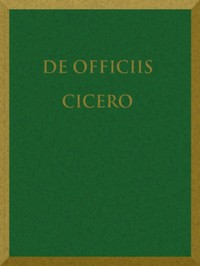De Officiis by Marcus Tullius Cicero
"De Officiis" by Marcus Tullius Cicero is a philosophical treatise written in the 1st century BC. The work focuses on ethical principles, particularly moral duties and their applications in public and private life. Cicero, addressing his son Marcus, draws on Greek philosophy to present a practical guide to ethical behavior—essentially outlining the obligations one has towards oneself and society. The opening of "De Officiis" establishes the context for this ethical exploration as
Cicero writes to his son, who is studying in Athens. He emphasizes the importance of combining Greek and Latin studies for a comprehensive understanding of philosophy and oratory. Cicero then discusses the practical importance of moral duties, asserting that these obligations are ubiquitous in life and form the foundation of moral goodness. He highlights the differences between absolute duties and those dependent on situations, introducing the philosophical frameworks he will build upon throughout the treatise, primarily drawing on Stoic thought. (This is an automatically generated summary.)
Read now or download (free!)
| Choose how to read this book | Url | Size | ||||
|---|---|---|---|---|---|---|
| Read online (web) | https://sendtokindle.compellingsciencefiction.com/ebooks/47001.html.images | 1013 kB | ||||
| EPUB3 (E-readers incl. Send-to-Kindle) | https://sendtokindle.compellingsciencefiction.com/ebooks/47001.epub3.images | 464 kB |
Send
to kindle email: |
|||
| EPUB (older E-readers) | https://sendtokindle.compellingsciencefiction.com/ebooks/47001.epub.images | 491 kB | ||||
| EPUB (no images, older E-readers) | https://sendtokindle.compellingsciencefiction.com/ebooks/47001.epub.noimages | 417 kB | ||||
| Kindle | https://sendtokindle.compellingsciencefiction.com/ebooks/47001.kf8.images | 760 kB | ||||
| older Kindles | https://sendtokindle.compellingsciencefiction.com/ebooks/47001.kindle.images | 682 kB | ||||
| Plain Text UTF-8 | https://sendtokindle.compellingsciencefiction.com/ebooks/47001.txt.utf-8 | 723 kB | ||||
| Download HTML (zip) | https://www.gutenberg.org/cache/epub/47001/pg47001-h.zip | 439 kB | ||||
| There may be more files related to this item. | ||||||
About this eBook
| Author | Cicero, Marcus Tullius, 107 BCE-44 BCE |
|---|---|
| Translator | Miller, Walter, 1864-1949 |
| Title | De Officiis |
| Note | Wikipedia page about this book: https: //en.wikipedia.org/wiki/De_Officiis |
| Note | Reading ease score: 57.4 (10th to 12th grade). Somewhat difficult to read. |
| Credits | Ted Garvin and the Online Distributed Proofreading Team |
| Language | English |
| Language | Latin |
| LoC Class | PA: Language and Literatures: Classical Languages and Literature |
| Subject | Ethics -- Early works to 1800 |
| Category | Text |
| EBook-No. | 47001 |
| Release Date | Sep 29, 2014 |
| Most Recently Updated | Feb 2, 2022 |
| Copyright Status | Public domain in the USA. |
| Downloads | 1358 downloads in the last 30 days. |
| Project Gutenberg eBooks are always free! | |

